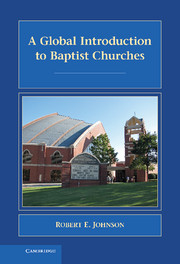Book contents
- Frontmatter
- Contents
- List of Illustrations
- Acknowledgments
- List of Important Baptist Organizations
- Global Baptist Timeline
- Introduction
- PART I FOUNDATIONS
- PART II AGE OF EMERGING BAPTIST DENOMINATIONAL TRADITIONS
- PART III THE FRONTIER AGE
- PART IV AGE OF PROLIFERATING TRADITIONING SOURCES
- PART V BELIEFS AND PRACTICES
- 9 Baptists' Beliefs and Practices
- Conclusion
- Index
- References
Conclusion
A New Context for Baptist Identity
Published online by Cambridge University Press: 05 September 2012
- Frontmatter
- Contents
- List of Illustrations
- Acknowledgments
- List of Important Baptist Organizations
- Global Baptist Timeline
- Introduction
- PART I FOUNDATIONS
- PART II AGE OF EMERGING BAPTIST DENOMINATIONAL TRADITIONS
- PART III THE FRONTIER AGE
- PART IV AGE OF PROLIFERATING TRADITIONING SOURCES
- PART V BELIEFS AND PRACTICES
- 9 Baptists' Beliefs and Practices
- Conclusion
- Index
- References
Summary
Baptists globally consist of a multitude of independent bodies that are sometimes connected formally through covenants of cooperation, sometimes bonded informally through common interests and goals, and sometimes not connected at all. Each Baptist entity, at any given time, usually is experiencing some combination of all three states of connectedness in relation to an array of other Baptist entities. Thus, with no centralized defining authority, how does one decide what is and is not Baptist? Some observers object that this is not even the correct question to be asking when exploring issues of identity in a postmodern context.
To a significant degree, Baptist is a self-designation. Over the past four centuries, individuals and groups have embraced the nomenclature for varied reasons, but most commonly they have done so on ecclesiological and soteriological grounds. As with many aspects of identity in a multiethnic, multicultural, and pluralistic society, blending can confuse the traditional lines of designation so thoroughly that for many people such identity becomes a matter of choice. Interpretative authorities try to offer what are usually very culturally biased attempts at definition, but there are no external powers capable of enforcing those designations on other Baptists. The product of such effort at best is capable only of defining or characterizing a specific body of Baptists in a particular way at a circumscribed period in time. Even then the designation would have validity only to the extent that significant numbers within that Baptist body agreed to accept the definitions.
- Type
- Chapter
- Information
- A Global Introduction to Baptist Churches , pp. 428 - 432Publisher: Cambridge University PressPrint publication year: 2010

